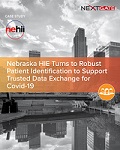Health Information Exchange (HIE) is happening every minute of every day. Your personal health information is moving and being viewed to improve the quality of your healthcare and lower the costs. The job will not be complete until all health records are digital and interoperable. Here’s what’s happening to make that reality.
Listen
From Healthcare IT Today, with hosts John Lynn and Colin Hung: Interoperability We Don’t Talk About – Everyone in healthcare likes to talk about interoperability…or the lack thereof. Although, there’s a lot of different types of healthcare interoperability. While most of the interoperability discussion is around clinical interoperability, we wanted to take a minute and talk about other areas of interoperability that we don’t talk about nearly as much. In this episode we talk about the health pricing transparency rule and how that information is being share along with whether the rule will change patient behavior. Then, we also dive into operational data interoperability including things like COVID data and SDoH data.
News and Noted
Carequality Announces New Executive Director Alan Swenson
Carequality (@CarequalityNet), the trusted exchange framework for nationwide health information exchange, announced that Alan Swenson, a respected interoperability expert and passionate Carequality volunteer, is joining the organization as the new executive director. Charged with expanding the adoption and use of the framework, Swenson will oversee all strategy and operations.
EHNAC and UDAP.org Offer Roadmap for Interoperability Requirements with the Launch of TDRAAP Star Level Glide Path
EHNAC (@EHNAC) in collaboration with UDAP.org (@udapTools), announced the launch of the Trusted Dynamic Registration & Authentication Accreditation Program (TDRAAP) Star Level Glide Path. Through this new program structure, healthcare stakeholders – including application developers, healthcare systems and payer organizations – are provided with a roadmap offering a consistent methodology to be followed by the industry during the collective move from the basic use of OAuth 2.0, to a more scalable and efficient framework providing advanced security and scalability through reusable client application, server, identity provider and end user credentials.
State Strategies To Advance Health Data Interoperability
The goal of this paper from the National Governors Association (@NatlGovsAssoc), is to share strategies governors and other state leaders can pursue to expand access to data and technology that will improve the health and wellbeing of our nation. To optimize health outcomes and control costs, it is critical that states, health care providers, and payers collect and share health care data. Many health information technology (HIT) systems have limited or no ability to share data across platforms due to a lack of data standards adoption and disconnected networks. This becomes a particularly difficult challenge to navigate when new opportunities or threats emerge requiring widespread information sharing, like the COVID-19 pandemic.
Innovation Care Partners Selects VirtualHealth for Care Management
VirtualHealth (@VirtualHealth_) announced Innovation Care Partners (ICP), a clinically integrated network and accountable care organization, is live on the HELIOS® platform, the leading SaaS care management solution. Serving ICP’s 175,000 covered lives and more than 100 care managers, VirtualHealth’s technology has enabled intelligent workflow automation, increased productivity, and the system-wide data exchange using Fast Healthcare Interoperability Resources (FHIR) standards. ICP selected HELIOS as the best available technology to scale its services and optimally manage its patient population.
Practice and Market Factors Associated With Provider Volume of Health Information Exchange
According to a recent JAMIA study (@AMIAinformatics), HIE use during referrals is low among office-based providers with the capability for exchange, especially PCPs. Practice-level factors were more commonly associated with greater levels of HIE use than market-level factors. Results included, providers used HIE in 49% of referrals; PCPs used HIE in fewer referrals (43%) than non-PCPs (57%). Provider use of products from EHR vendors was negatively related to HIE use, while use of Athenahealth and Greenway Health products were positively related to HIE use. Providers treating, on average, older patients and greater proportions of patients with diabetes used HIE for more referrals. Health system membership, market concentration, and state HIE consent policy were unrelated to provider HIE use.
Resources
AHIMA Helps Prepare Health Information Professionals for Information Blocking Final Rule
As healthcare stakeholders in the United States prepare for the information blocking final rule to take effect on April 5, the American Health Information Management Association (AHIMA) (@AHIMAResources) has created evidence-based resources to help health information professionals and other healthcare professionals comply with the rule.
Events
This is your chance to interact with #HL7 standards experts at the WGM, May 24-28! Mark your calendar, register now and join us to connect with colleagues and advance interoperability. https://t.co/mccvpoZfPU #HL7WGM #interoperability #healthIT pic.twitter.com/3oYHgAmc15
— HL7 International (@HL7) April 10, 2021
Organizations
PATIENT ID NOW
Patient ID Now is a coalition of healthcare organizations representing a wide range of healthcare stakeholders committed to advancing through legislation and regulations a nationwide strategy to address patient identification. Read more about the coalition.
- Patient Matching: An Essential Tool in the Era of COVID-19
Free Recording
The COVID-19 pandemic has highlighted the importance of ensuring patients are accurately matched to their medical records, yet the problem of patient misidentification persists, endangering patient safety, and the public health response. Listen to the newly formed Patient ID Now Coalition during a virtual hill briefing with health leaders on July 7. They dive into the implications of patient matching and identification during the pandemic.
Patient ID Now Coalition Pleased Congress is Addressing Patient Misidentification
Patient ID Now, a coalition of leading healthcare organizations, including the American College of Surgeons, the American Health Information Management Association (AHIMA), the College of Healthcare Information Management Executives (CHIME), Healthcare Information and Management Systems Society (HIMSS), Intermountain Healthcare and Premier Healthcare Alliance, is pleased that the U.S. House of Representatives voted to remove the longstanding ban in its Labor, Health and Human Services, Education, and Related Agencies appropriations bill that stifles innovation around patient identification.
The Strategic Health Information Exchange Collaborative
SHIEC (@SHIEClive) is the National Trade Association for Health Information Exchange Organizations. It is routine for important data about patients’ ongoing care to reside in multiple unconnected organizations. SHIEC member HIEs use information technology and trusted relationships in their service areas to enable secure, authorized exchange of patient information among disparate providers. By providing enhanced access to all available and relevant patient data SHIEC HIE members aim to improve the quality, coordination, and cost-effectiveness of health care provided in their communities. Read their news feed.
SHIEC Annual Conference Call for Proposals is NOW OPEN!
The SHIEC Events Committee is seeking speaker proposals for the 2021 SHIEC Annual Conference that will be held August 15 – 18, 2021 at the Westin Kierland Resort & Spa in Scottsdale, Arizona. SHIEC is working on a hybrid conference approach this year (a combination of in-person and virtual attendance), and as the SHIEC Events Committee prepares for SHIEC21, we will continue to monitor the national and local progress in responding to the COVID pandemic and the vaccine rollout. All proposals are due by April 26, 2021. Speakers will be notified no later than June 15, 2021 if their presentation has been accepted for the conference. Since we intend this to be a hybrid conference, please indicate if each speaker can present in-person or virtual only. Proposals received after the deadline will not be accepted.
The Sequoia Project
The Sequoia Project (@SequoiaProject) was chartered to advance the implementation of secure, interoperable nationwide health information exchange. The ONC transitioned management of its eHealth Exchange to The Sequoia Project for maintenance. Since 2012, the Exchange has grown to become the largest health information exchange network in the country.
The Sequoia Project Offers 13-Week Information Blocking Compliance Boot Camp Again in 2021
The Sequoia Project, a non-profit dedicated to solving health IT interoperability for the public good, has launched a second edition of its popular information blocking compliance boot camp program to help healthcare and health IT communities prepare for the updated April 5, 2021 deadline to comply with U.S. Office of the National Coordinator for Health IT (ONC) information blocking and interoperability rules.
The CommonWell
CommonWell Health Alliance (@CommonWell) is devoted to the simple vision that health data should be available to individuals and providers regardless of where care occurs. Additionally, provider access to this data must be built-in health IT at a reasonable cost for use by a broad range of health care providers and the people they serve.
Slow COVID-19: CommonWell Member Resources & Initiatives
Since inception, CommonWell members have been innovators and game changers in the health IT space. Today is no different. In this time of uncertainty and stress to both our health system and our personal wellbeing, it is not surprising that their members once again are stepping up to the challenge to solve some of our world’s biggest challenges. Through their website, they will continue to share and update what their members are doing in the fight to slow COVID-19, provide necessary care coordination resources, and ultimately, help save lives.
DirectTrust
A pioneer in offering technical trust and confidence in the secure exchange of health information, DirectTrust (@DirectTrustorg) is committed to collaboration for advancing secure communication. As a non-profit trade alliance, DirectTrust operates not only as a membership organization, but also as an ANSI-accredited standards body, a trust framework supported by policy, and an accreditor for reliable and trusted exchange across the DirectTrust network. Read their News and Events.
Join us for @mickytripathi1‘s Keynote at the 2021 #DirectTrustSummit!
Save your seat by registering at https://t.co/ENXnP1rLMC pic.twitter.com/RiHJJWKfgi
— DirectTrust (@DirectTrustorg) April 11, 2021
HL7
Founded in 1987, Health Level Seven International (HL7) (@HL7) is a not-for-profit, ANSI-accredited standards developing organization dedicated to providing a comprehensive framework and related standards for the exchange, integration, sharing, and retrieval of electronic health information that supports clinical practice and the management, delivery and evaluation of health services. HL7 is supported by more than 1,600 members from over 50 countries, including 500+ corporate members representing healthcare providers, government stakeholders, payers, pharmaceutical companies, vendors/suppliers, and consulting firms. Read their newsfeed.
Resources
 Case Study: NEHII Rises to the Challenge of COVID-19 with Cloud-Based Analytics and Robust Patient Matching Tools
Case Study: NEHII Rises to the Challenge of COVID-19 with Cloud-Based Analytics and Robust Patient Matching Tools
The Nebraska Health Information Initiative (NEHII) is a leading non-profit health information exchange (HIE) serving more than 4 million residents across 300 participating health care providers, payers and the State of Nebraska. NEHII partnered with NextGate to accurately match and connect critical public health information across the state of Nebraska to support trusted data exchange and case reporting for COVID-19 using an Enterprise Master Patient Index on Amazon Web Services (AWS).
Download this eBook by NextGate (@NextGate) to read the case study.
 Consensus: The Chase for Interoperability
Consensus: The Chase for Interoperability
In its continued campaign to bring about data interoperability across the healthcare industry by 2024, the HHS’s Office of the National Coordinator (ONC) and Centers for Medicare & Medicaid Services (CMS) jointly released a set of new rules in 2019 to further promote the seamless exchange of protected health information (PHI). Despite increasing attempts to facilitate interoperability through regulations, the challenges lie elsewhere in creating seamless data exchange among a patient’s physician, hospital, labs, pharmacy, and others along the continuum of care.
Download this paper by eFax Corporate (@eFaxCorporate) to learn more about the fastest, most cost-effective way for your organization to access and share patient data through one interoperable platform.
eHealth Initiative Resource Center
Interoperability Files – Check out the new white paper resource in the eHealth Initiative’s (@eHealthDC) Resource Center: Case Study: Remote Patient Monitoring
ONC Interoperability Pledge
Companies that provide 90 percent of electronic health records used by hospitals nationwide as well as the top five largest health care systems in the country have agreed to implement three core commitments: Consumer Access, No Blocking/Ensuring Transparency, and Standards. The ONC (@ONC_HealthIT) wants vendors to sign a pledge. Is your vendor pledging? Find out who is on the list.
